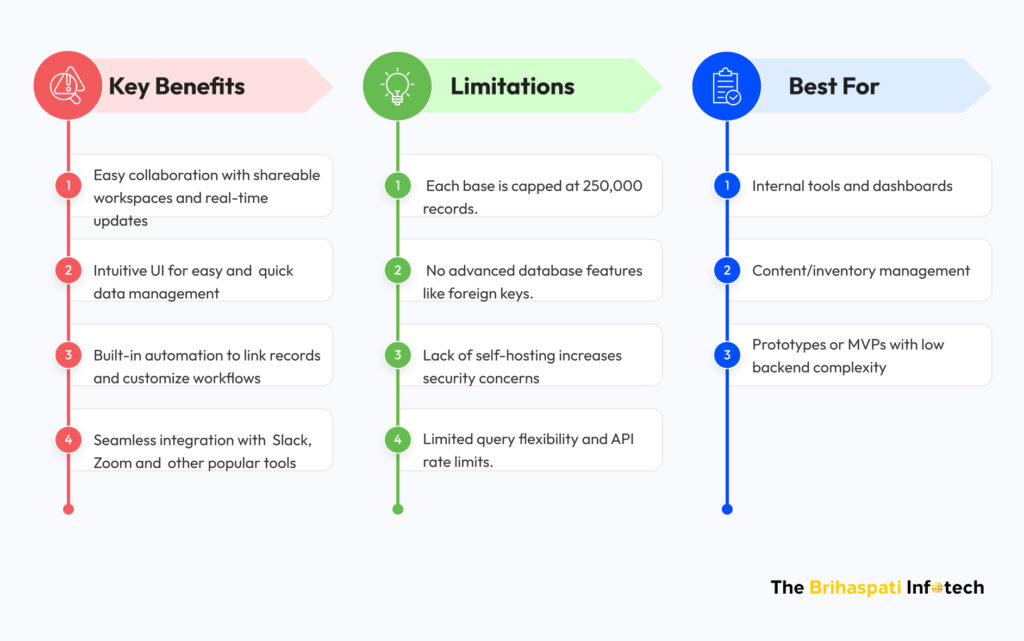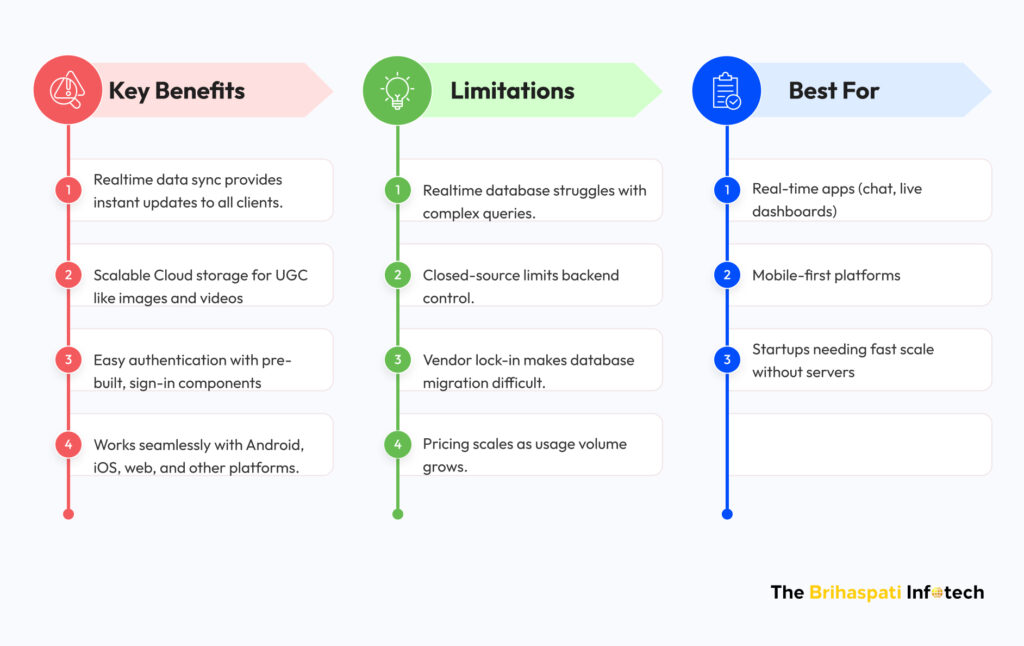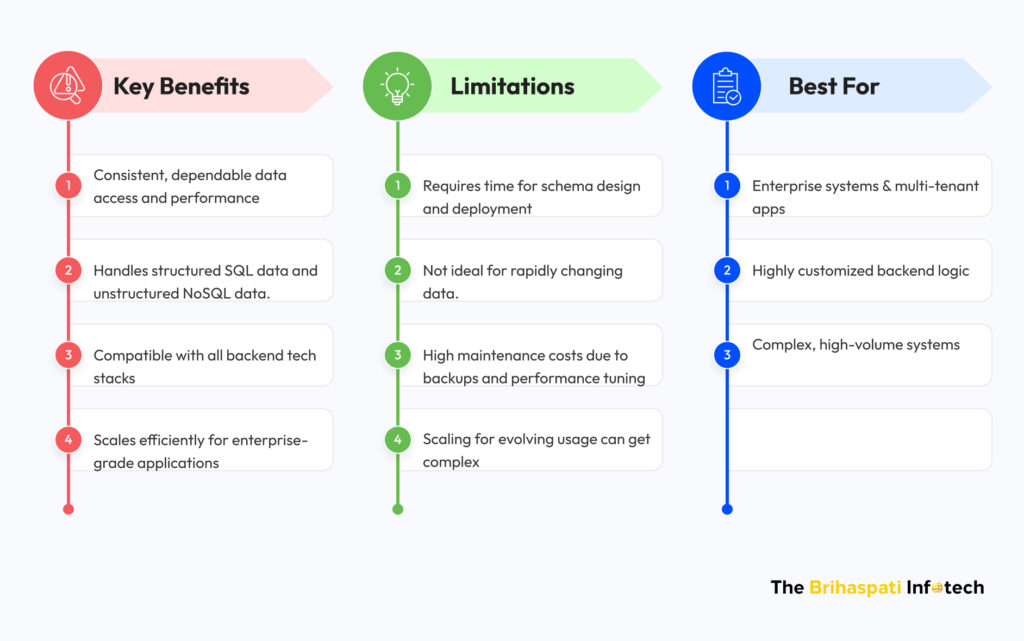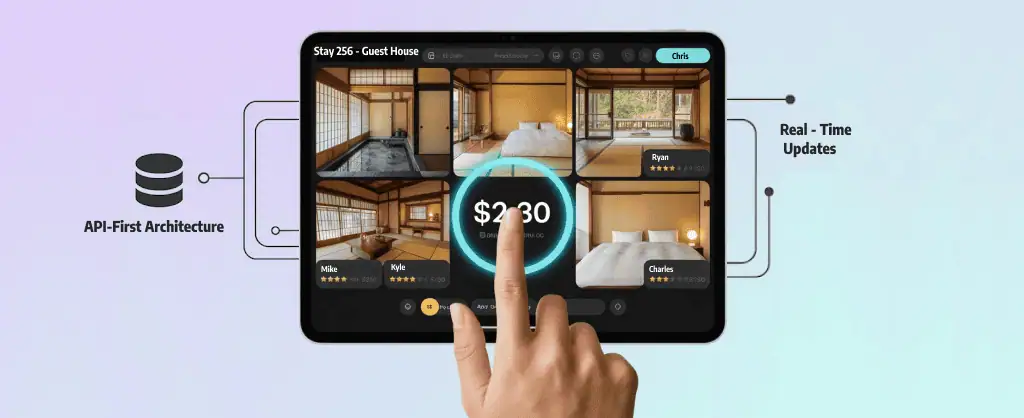
Airtable Vs Firebase Vs SQL Databases: Which Is Best for Your App?
Choosing the wrong database can stall your project—and cost you significantly. Whether you’re building a responsive web app, a real-time mobile app, or a high-traffic enterprise platform, understanding different database options can help you make an informed decision.
In this blog, we walk you through Airtable comparison with Firebase and traditional SQL databases from the perspective of our web and mobile app development team. It includes explaining each platform’s strengths, limitations, and trade-offs, so you can choose the right database for your next project.
Without any further ado, let’s get started.
Airtable Vs Firebase vs Traditional SQL Databases: Technology Overview
What is Airtable?
Airtable is a cloud-based data management platform that helps store and organize data in a spreadsheet-like format. It allows teams to organize, manage, and link data using intuitive tables, views, and workflows. The best part, even non-technical users can use it without writing code.

What is Firebase?
Firebase is a Backend-as-a-Service (BaaS) platform developed by Google. It provides a suite of tools and services that simplify web and mobile app development.

What are Traditional SQL Databases?
Traditional SQL databases involve storing and managing structured data in tables with rows and columns. They offer full control and are ideal for systems requiring structured, relational data or complex custom logic.
For e.g. MySQL, Oracle, and SQL Server

Quick Airtable Comparison Table: Airtable Vs Firebase Vs Traditional Databases
Let’s take a quick look at Airtable comparison with Firebase, and traditional SQL databases based on various parameters.
| Feature / Criteria | Airtable | Firebase | Traditional Databases |
| Primary Use Case | Low-code data management | Real-time, serverless app backend | Customizable structured/unstructured storage |
| Ease of Use | Easy, even for non-technical users | Moderate with a managed backend | Less; Needs setup and backend integration |
| Collaboration | Excellent | Limited | Manual Implementation |
| Data Model | Tables with linked records | NoSQL or Realtime Database | Flexible — SQL or NoSQL |
| Automation & Integrations | Built-in automations & integrations with Slack and more tools | Integrates tightly with Google Cloud, Android, and Firebase services | Integrations must be configured manually using APIs |
| Hosting | Fully Cloud-hosted | Fully Cloud-hosted | Cloud or Self-hosted |
| Query Complexity | Limited query capabilities | Limited query capabilities | Full SQL/NoSQL querying |
| Security & Control | Low; No self-hosting | Low; No self-hosting | High; self-hosting available |
| Scalability | Moderate — record limits (250k per base) | Good, but costs rise with scalability | Excellent, but depends on database type |
| Pricing | Starting from $20/mo | Pay-as-you-go | ~$30–60/mo (Cloud) |
| Recommended For | Easy data collaboration without coding | Building real-time, cross-platform apps | Custom and high-demand projects |
When to Choose Airtable Vs Firebase Vs Traditional SQL Databases?
Let’s walk you through Airtable comparison with Firebase and other conventional databases via practical industry-centric examples.
Use Case 1: Internal CRM for a Startup
A small startup needs a simple, low-cost platform to manage partner contacts, track leads, and store meeting notes. They want a tool that even their non-technical team can update without help.
Solution — Airtable:
- Why it works: Airtable’s intuitive UI works well for everyone, including non-techies.
- What it delivers:
- Quick setup in hours, not weeks
- Easy collaboration with team members
- Visual, customizable views for contacts, pipelines, and notes
- Quick setup in hours, not weeks
- Result: The startup saves development costs, launches products fast, and enjoys complete control of the CRM.
Use Case 2: Real-Time Event Booking App
An event company needs a web app that enables users to register and instantly see seat or ticket availability. Real-time updates are critical, so customers don’t overbook or miss events. The app also needs secure login and automated confirmations.
Solution — Firebase:
- Why it works: Firebase enables real-time data updates across all devices instantly.
- What it delivers:
- Real-time inventory updates with zero page reloads
- Firebase auth for secure logins
- Cloud Functions for automated emails and quota updates
- Real-time inventory updates with zero page reloads
- Result: Customers get a smooth, instant booking experience while the company saves big on custom backend infrastructure.
Use Case 3: Custom Enterprise Inventory System
A multi-warehouse enterprise requires a highly customized system with:
- Role-based access control
- Real-time syncing between multiple warehouse databases
- Detailed audit logging for compliance
- Complex reporting and analytics
Solution — PostgreSQL + Express + React:
- Why it works: Traditional relational databases like PostgreSQL handle complex queries, enforce strict data integrity, and scale predictably.
- What it delivers:
- Highly customizable workflows and permissions
- Secure, auditable data management
- Flexible integration with ERP or BI tools
- Highly customizable workflows and permissions
- Result: The enterprise gets a long-term, scalable solution tailored exactly to their operational and compliance needs.
Frequently Asked Questions
Firebase uses a NoSQL, document-based model with real-time syncing, making it ideal for live, collaborative apps. SQL databases use structured schemas and are better for data that requires strong relational integrity and complex queries.
Airtable supports basic permissions and password-protected sharing. However, it’s not recommended for highly sensitive or regulated data like HIPAA or financial information.
In many cases, you don’t need a traditional backend if you use. However, you might still need a traditional backend if you:
1. Need complex server-side logic
2. Prioritize high compliance/security requirements
3. Want advanced relational data modeling
4. Seel complete control over the backend infrastructure
Yes, many teams begin with Airtable or Firebase and then migrate to SQL databases as their app scales. However, migrating can be time-consuming, so it’s important to plan data structures with future scalability in mind.
Airtable cannot fully replace Firebase in all use cases, as they serve different primary purposes and offer distinct functionalities. While Airtable can function as a data backend for certain applications, it lacks the comprehensive suite of services that Firebase provides for app development.
Airtable Vs Firebase or Traditional SQL Databases? Let’s Select the Database
There’s no single “best” backend — only the one that fits your project goals and long‑term vision. Many teams begin with Airtable for speed, switch to Firebase for real‑time capabilities, and later move to SQL for scale and flexibility.
Choosing wisely and save your valuable resources — months of redevelopment and thousands in migration costs. Our API integration services ensure the database you choose work seamlessly with your app’s architecture.
Whether you need help selecting database or a complete web or mobile app solution, we’re here to help. Book a free strategy call today
Stay Tuned for Latest Updates
Fill out the form to subscribe to our newsletter








